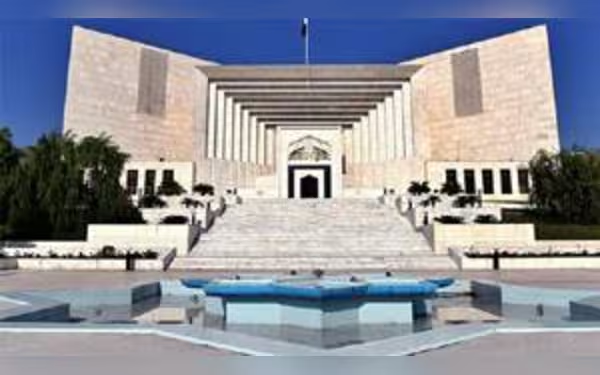Saturday, November 16, 2024 05:47 PM
Supreme Court Faces Multiple Petitions Against 26th Constitutional Amendment
- Petitions challenge validity of 26th Amendment.
- Call for Full Court to deliberate on issues.
- Allegations of vote manipulation in Parliament.
 Image Credits: nation_pk
Image Credits: nation_pkMultiple petitions filed in Supreme Court challenging the 26th Amendment's validity and calling for an independent inquiry into vote manipulation.
In recent developments, the Supreme Court of Pakistan has been approached with multiple petitions challenging the validity of the 26th Constitutional Amendment. This amendment has sparked significant debate regarding its adherence to the Constitution and the legal framework of the country. The petitions, filed on a Friday, include prominent figures such as Akhtar Mengal, the former Chief Minister of Balochistan, and other notable politicians like Fahmida Mirza, Mustafa Nawaz Khokhar, and Mohsin Dawar. They are joined by Advocate Salahuddin Ahmed, who has also submitted a petition on this matter.
The petitioners are urging the Supreme Court to convene a Full Court, comprising all eligible judges, to deliberate on this critical issue. They argue that the separation of powers among the executive, legislature, and judiciary is essential for the functioning of a democratic state. Historically, there have been concerns regarding judicial overreach into the domains of the executive and legislative branches. However, the current situation highlights a different concern: parliamentary overreach into the judicial domain.
The petitioners emphasize that the three branches of government must maintain a system of checks and balances. They warn against allowing this delicate balance to devolve into a "game of constitutional tit for tat." This phrase underscores the potential for escalating conflicts between the branches of government, which could undermine the rule of law.
Moreover, the petitioners have called for an independent inquiry into allegations of coercion and manipulation of votes within Parliament concerning the passage of the 26th Amendment. They assert that the process through which this amendment was enacted was fundamentally flawed and, therefore, lacks legal standing. They argue that the amendment is "non est," meaning it has no legal effect and should be considered as if it never existed.
Furthermore, the petitioners contend that the so-called "Constitutional Benches" of the Supreme Court cannot assess the constitutionality of the very legislative act that established them. They argue that it is inappropriate for members of the Constitutional Bench to judge a matter in which they have a vested interest.
In addition, the petitioners claim that the 26th Amendment is substantively ultra vires, meaning it goes beyond the powers granted by the Constitution, particularly concerning the independence of the judiciary, the separation of powers, and the principles of federalism.
This ongoing legal battle raises important questions about the integrity of Pakistan's constitutional framework and the balance of power among its governing bodies. As the Supreme Court prepares to hear these petitions, the outcome could have far-reaching implications for the future of governance in Pakistan. It is crucial for the judiciary to uphold the Constitution and ensure that all legislative actions are conducted within its bounds. The resolution of this matter will not only affect the involved parties but will also set a precedent for how constitutional amendments are approached in the future.













